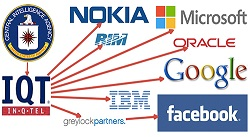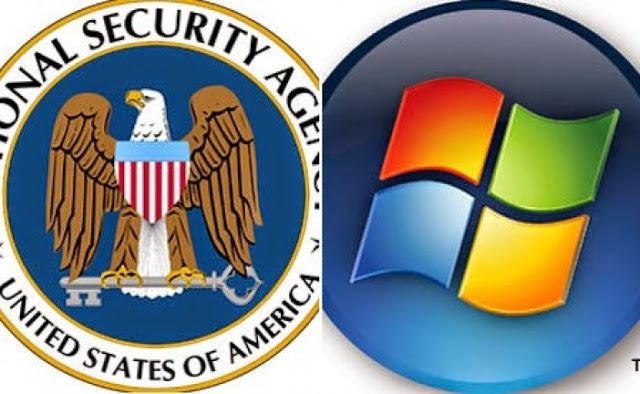| Previous
Page |
PCLinuxOS
Magazine |
PCLinuxOS |
Article List |
Disclaimer |
Next Page |
Don't Breed Crows: How Big Techs Started Out As US Government Projects, And Today They Threaten Democracy |
|
by Alessandro Ebersol (Agent Smith)  There is an old Spanish saying that goes like this: "don't breed Crows, they'll sting your eyes," and this saying fits perfectly with the class of American tech companies, the so-called Big Techs. Yes, with a few exceptions, most Big Techs were born as projects of the US government, US Army, CIA or NSA. Or, they are entwined with the American government, in one way or another. I stress that everything that has been written in this text is not secret. It is available on several websites on the internet, and, there is nothing new here. Just search, and anyone will find this information. The CIA has grown too much, and so have its tentacles  The CIA, the American Central Intelligence Agency, was born in 1947, as a successor to the OSS (Office of Strategic Services), which was the agency that operated during World War II. The CIA expanded rapidly outside its intelligence-gathering mandate, to include covert operations and unauthorized operations (the so-called black ops). By providing funding and organization, it proved to be a vital step in the development of a fief within the American state, an organization that has grown so much that it has become an end in itself. It can be said today that the CIA is an almost autonomous body, which responds to the President and the American Congress, but only if investigative committees are set up. With so much looseness about its actions, the "company" "had enough freedom to create its own venture capital firm, In-Q-Tel." In the words of a former CIA director, George Tenet, "We [the CIA] decided to use our limited dollars to leverage technology developed elsewhere. In 1999 we created In-Q-Tel. While we (CIA) are paying the bills, In-Q-Tel is independent of the CIA. The CIA identifies pressing problems, and In-Q-Tel provides the technology to solve them. The In-Q-Tel alliance has put the agency back at the forefront of technology. This collaboration allowed the CIA to take advantage of the technology Las Vegas uses to identify crooked card players and apply it to analysis for terrorists, and to adapt the technology online booksellers use and convert it to scour millions of pages of documents for unexpected results." Outsourcing the CIA's activities is also a way to keep them hidden from public opinion, since private companies do not have to account for their activities. Hillhouse wrote on July 8, 2007, in the Washington Post, "Tell me that more than 50% of the National Clandestine Service (NCS) - the heart, brain and soul of the CIA - has been outsourced to private companies such as Abraxas, Booz Allen Hamilton, Lockheed Martin and Raytheon." Startups that received funds from In-Q-Tel  Now, let's list some technology companies that have received funds from In-Q-Tel: Google For two decades, the US intelligence community (CIA, NSA and DARPA) worked closely with Silicon Valley in an effort to locate citizens in cyberspace. Google is at the heart of this origin story. Some of the research that led to Google's ambitious creation was funded and coordinated by a research group established by the intelligence community to find ways to track individuals and groups online. I myself wrote a series of eight articles that appeared here in The PCLinuxOS Magazine on the genesis of Google, so there is not much else to talk about here. It is a company that has in its roots a close association with the American intelligence bodies. Facebook LifeLog was a project of the Office of Information Processing Techniques of the Defense Advanced Research Projects Agency (DARPA) of the United States Department of Defense (DOD). According to its 2003 bid request pamphlet, it would be "an ontology-based subsystem that captures, stores, and makes accessible the flow of a person's experience and interactions with the world in order to support a broad spectrum of associates/assistants and other system capabilities." The purpose of the LifeLog concept was to "be able to track the life lines of an individual in terms of events, states, and relationships", and the system has the ability to "monitor all of a subject's experiences, from dialed phone numbers, from read email messages, to every breath taken, every move made, or place visited." Scary, right? The government funded the initial money for Facebook through the CIA's personal venture capital investment firm, In-Q-Tel, and then, through a sort of revolving door scheme, they (Facebook) just hired DARPA executives to work for the same companies they had helped create since its inception. Regina Dugan, for example, ran Facebook's "Building 8," where DARPA and government-funded projects are being implemented. Before that, Regina Dugan left DARPA for Google and then for Facebook Building 8. Where she's going to appear next, no one knows, but we can be sure it's probably some kind of government spying initiative or a CIA DNA data capture cloud.  Oracle Founded in May 1977, the company's name came from a CIA project called Oracle. Company co-founders Larry Ellison, Robert Miner and Ed Oates worked on the Oracle project at a consulting firm before working on their own. Larry Ellison wrote in the New York Times in January 2002: "The only step that Americans could take to make life harder for terrorists would be to ensure that all information in numerous government databases is copied to a single, comprehensive national security database." But who watches the watchmen? Who's to say that only the "bad guys" are in these databases? Maybe they shouldn't create these databases. Even assuming the best-case scenario, in which Oracle is not actively enabling all kinds of domestic espionage, which Americans have rightly been concerned about since the Snowden revelations, it seems that the quality of the company's product security are still cause for concern. "Of all commercial databases, Oracle is the least secure," British security expert David Litchfield recently told Reuters. This is a problem, both from the point of view of national security and even from the point of view of consumer confidence. Because today, everyone uses Oracle databases, and they're subject to data theft by external crackers. Microsoft The company that was born in 1975 in Albuquerque, New Mexico, as a creator of BASIC interpreters for microcomputers, and then, through a series of misadventures, became the largest software company in existence, also has very deep ties to intelligence agencies.  Microsoft has been working closely with U.S. intelligence services to allow users' communications to be intercepted, including helping the National Security Agency circumvent the company's own encryption, according to top-secret documents obtained and leaked by Edward Snowden in 2013. These documents show the complicity of several technology companies, in the so-called Prism project. The documents demonstrate that:
Now, I invite you to think a little. I've known Microsoft for many years, and this company amasses more flops than hits. Indeed, Microsoft, were it any other company, would have been bankrupt and closed for many years now. But no. It looks like they have a cash printer in Redmond, or does the American government not let the company break, to not lose its source of backdoors ? Something to think about. Other than these companies, In-Q-Tel invests in other, little-known companies ranging from video games and virtual reality, to big data and data capture from social networks. But, but, Big Techs generate a lot of jobs and taxes for governments. They develop the place where they operate. Just they don't. Big Tech are vertical organisms that only generate benefits for themselves. Let me explain. If I have a car factory, the production is horizontal. As a car manufacturer, I'm going to need tires, car seats, windshields, and not everything I can produce. Thus, when a car factory settles in a city, it generates benefits for everyone in the city: rental houses for workers, restaurants, for employees, other companies that will produce items that will be used in cars (windshields, mirrors, tires, etc.). Thus, it is a virtuous circle, where everyone close to the factory profits from its production. Only big techs aren't like that. They are extremely vertical companies. That is, they produce the raw material of their final products themselves. And, the thing is going to a point, that the big Microsoft and Apple want to stop using third-party chips and manufacture their own processors, not to depend on other factories anymore. Thus, they would have full control of the production and prices charged. But don't think a MacBook is going to get cheaper because of it. No, Apple's profit margin is going to get bigger. But, with their data centers, big techs move the local economy. After all, they must have buildings with servers and people to operate these servers. Negative. The big techs are very scattered around the globe, and often rent servers around the world, wherever it is cheaper. Or, when they choose a location to set up a data center, it's usually a cheap place, with plenty of water (to cool their servers) and, small towns, where the cost of living is low. Since data centers are operated remotely, they do not need to have a very large staff, so staffing costs are kept low. That is, they do not move the local economy much, but they benefit the shareholders. But, but, the Big Techs must hire a lot of programmers. And this staff should earn well. No again. Usually, these companies hire technical personnel from countries such as Pakistan, India, Thailand, the Philippines (formerly China, but now specialized labor is being harnessed in the country itself), which are generally cheaper than workers in countries with a more parity exchange with the dollar, thus keeping the cost with staff low. Some examples that have been documented in the media are: Microsoft (where's my surprised face?) - India In 2010, Microsoft signed a three-year contract with Infosys Technologies to manage significant portions of its internal IT operations worldwide. The agreement included specific services such as technical assistance, database management, software applications and devices. The agreement covered more than 450 locations across 104 countries. Located in Bangalore, India, Infosys had already partnered with Microsoft in certain areas, but this particular business further expanded that relationship. Infosys has also partnered with Unisys Corporation in Pennsylvania to provide technical support to desk and deskside service to Microsoft employees. This Agreement has seen Infosys improve its capabilities to help other customers leverage Microsoft innovations and adopt new technologies. General Electric (GE) - India General Electric decided to focus on India and invested about $130 million in the creation of a large state-of-the-art research and development center in Bangalore, India. This center is General Electric's largest research and development center and the company's second largest in the world and has qualified Indian professionals. The center is equipped with the latest engineering and technology tools and is responsible for interacting with GE customers, suppliers, subsidiaries, partners and other technology centers around the world. General Electronics also has a technology center in India that employs more than 2,200 engineers and scientists with Chemical Engineering, Mechanical Engineering, Polymer Science and new synthetic materials. GE has also opened an E-knowledge center in India to disseminate knowledge and technological developments to its business centers. CISCO - India The famous networking giant has invested more than.150 million in structuring and expanding its technology development company in India. Cisco has also set up its second largest R & D facility in Bangalore, India, which is home to over 1500 Indian technical professionals. Cisco's research and Development Center in Bangalore was developed to help the company deploy products and solutions faster, develop new technologies, as well as successfully meet customer demand by providing technical support. Cisco also has plans to make more investments in India and leverage the skills of Indian network professionals. The type of support offered is the Live Chat Support Services and email support service. Other than that, we have call centers, which, most often, are located in India. But, but, Big Techs should generate billions in taxes and help the economy, right ? No, definitely not. In fact, ALL, ALL Big Techs have tax evasion schemes. And, amazingly, it seems that Ireland's climate must be very good, since Apple chose Ireland to be its headquarters in Europe. Google also chose Ireland for its European headquarters. No, it has nothing to do with weather. Apple has settled in Jersey, the small island in the English Channel that, like many Caribbean havens, does not charge corporate profits taxes to most companies. Jersey would play a significant role in the new Irish tax structure set up by Apple, created in late 2014. Backed by this deal, the MacBook maker continued to enjoy ultra-low tax rates on most of its profits and now holds much of its earnings outside the U.S. on a $252 billion offshore cash mountain. Google has also settled in Ireland, and maintains remittances of profits to tax havens in Bermuda. By legally channeling the profits of foreign subsidiaries in Bermuda, which have no corporate income tax, Google has reduced its overall tax rate by almost half. Microsoft, for its part, hid US$108 billion in offshore profits, using a network of foreign subsidiaries to dodge U.S. taxes, bringing its tax rate to a tiny 4.5 percent in its offshore profits. This is lower than most middle-class families pay in taxes. Microsoft began building this tax maze more than 20 years ago when it changed software royalty rights to a fictitious company in Nevada to avoid a fee in its home state of Washington. This first domestic evasion eventually grew into the company's current tax evasion system based on tax havens around the world. Well, now that communications have migrated in droves to the internet, at least we're sure there's democracy to spread ideas, thanks to Big Techs! That couldn't be further from the truth. Let's take a look at the past. Let's remember Germany in 1933... When the German Ministry of Propaganda was born, and why was it born  Joseph Goebbels, minister of propaganda Founded on March 14, 1933, a few months after the Nazi takeover of power by Adolf Hitler's government, it was led by Reich Minister Joseph Goebbels. The role of the new ministry, which established its offices in the Orderpalals in front of the Reich Chancellery, was to centralize Nazi control of all aspects of German cultural and intellectual life. An undeclared goal was to present to other nations the impression that the Nazi Party had the full and enthusiastic support of the entire population. Censorship in Germany was vital to the maintenance of political control by the Nazis. He was responsible for the control of German media, literature, visual arts, cinema, theater, music and Broadcasting. And by controlling the media, Goebbels would control the narrative. And whoever controls the narrative controls the truth. After all, the facts, according to Goebbels, should be slaughtered, until reality is reduced to a mere matter of opinion. The truth? A simple choice of sides. My truth against your truth. Until one no longer knows how to distinguish what is true and what is not. And after more than 70 years of these events, they repeat themselves… On November 5 last year, the president of the United States, Donald Trump, noted the "historical interference in the elections of big money, big media and big tech" and labeled the Democratic Party as "the party of the big donors, the big media, the big technology". On January 6, 2021, during his speech to the crowd of protesters who stormed the U.S. Capitol, Trump accused the Big Techs of rigging the election and veiled banishment of conservatives, while promising to hold them accountable and work to get rid of Section 230. On January 11, after Trump's Twitter account was suspended, German Chancellor Steffen Seibert's chief spokesman noted that Angela Merkel considers the suspension of Trump's account "problematic," adding that lawmakers, not private companies, must decide on any necessary restrictions on free speech, and whether speech incites violence or not. So Big Techs control the media, now mostly occurring over the internet, these companies decide what's good, and what's bad. What can be broadcast and what should be silenced, controlling the narrative and, lately, the perceived "truth". But what truth is that? One that corroborates the narratives of Big Techs, which have grown so much that they can't be regulated anymore (thanks to a lot of lobbying in the U.S. government, they almost always escape without a scratch). Scott Galloway, a staunch critic of Big Techs, argued that the current situation is the result of economic deregulation, globalization and the failure of politicians to understand and respond to technological developments. And in this ignorance, these vultures thrive. A brief word before the end... President Kennedy regarded the ClA as a nuisance, something that hindered the U.S. government more than it helped. So much so that he promised to break the ClA into a thousand pieces and spread them in the wind. He was assassinated before that happened, and much is speculated about the role of a renegade ClA in this episode. Trump also wanted to end section 230, hold Big Techs accountable for their actions, their opinions, and, more importantly, for the censorship these companies exert in their vehicles. He ended up virtually "murdered." Things to think about. In a next opportunity, I want to discuss what is the purpose of this technology oligopoly, which today, along with the financial complex, controls the Western world. Until then, be careful with your Twitter accounts, email, Facebook, etc. |


